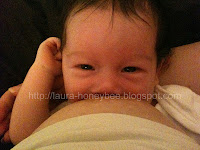Benefits of Breastfeeding
This week's theme is 'Benefits of Breastfeeding' which ought to be the easiest thing to write about. There are hundreds of benefits, but they're out there already for everyone to read at their leisure. Why should my repeating them be any better at spreading the word? So, I thought, how to make it more personal, more relevant? I asked myself the following - Why did I choose to breastfeed?
My Breastfeeding History
 |
| It's normal and natural |
My mum was a La Leche League counsellor. I have great memories of meeting with LLL families and playing with the other children while our mums sat chatting and nursing our siblings. And I remember going to women's houses and waiting while Mum helped them with feeding their tiny babies. It wasn't until I was a teenager that I really realised there was another way to feed a baby.
Why Did I Choose to Breastfeed?
I chose to begin breastfeeding because, in my mind, there was no other option. While I was pregnant I read everything I could about breastfeeding. I had no plan B, so I needed to be prepared. The more I read, the more amazing breastmilk turned out to be. I looked after my body during pregnancy - I ate well, didn't drink, walked. I wanted to give the little person growing inside me everything good. I was her food source - it had to be good and healthy. So, as I learnt about the almost magical properties of human milk, and, conversely, the damaging properties of formula, I was adamant that my baby would continue to get only what was good and healthy for her. Why would I spend 9 months being careful about what went into her, just to give that up at her birth?
 |
| The first feed provides antibody-rich colostrum |
- Lactoferrin - the baby's source of iron, it is antibacterial, fungicidal, antimicrobial and antiparasitic, supporting baby's immune system which is not fully developed until at least 3 years old. It protects against staphylococci and E. coli. It has a role in healing wounds.2 Heck, it makes breastmilk brilliant for clearing up a gunky eye, a bit of eczema, cradle cap, nappy rash, cracked nipples, cuts and scrapes, and much more. 3
- Docosahexanoic acid (DHA) - an omega-3 fatty acid needed for the development of a baby's nervous system and visual abilities, and for proper brain function. Breastmilk contains significant amounts - some formulas contain DHA, but this will come from fish oil or seaweed, and the long-term effects are not yet known.
- Arachidonic acid (AA) -an omega-6 fatty acid needed for the repair and growth of skeletal muscle tissue and for early and continued brain development. In a study cited in Developmental Medicine and Child Neurology (March 2000), infants given supplemental AA demonstrated significant improvements in intelligence. Human milk makes your kid smart! Some studies also suggest that AA improves insulin sensitivity, providing protection against diabetes.
- Lipase - an enzyme that breaks down fat. Human milk contains fat for brain development. The lipase allows baby to digest it easily. The quantity of fat increases during a feed too.
- Linoleic and linolenic acids - these help the body to develop high-quality myelin for coating the nerves, allowing them to transmit messages throughout the brain and body.
- Lysozyme - an enzyme that can kill salmonella and E. coli bacteria.
- Pancreatic Secretory Trypsin Inhibitor (PSTI) - protects and repairs the newborn's intestines.4
- I could go on and on, but the list is so long. If you want to see a comparison of the ingredients in breastmilk and formula, click here.
Human milk is alive. It's made from your blood supply, so it contains billions of white blood cells known as macrophages. They consume germs. It's also full of immunoglobulin A (IgA), which coats the intestines and stops bacteria from getting through, and prevents food allergies by stopping molecules of 'foreign' foods from entering the blood stream. Bacteria that baby comes into contact with are passed to you during a feed. Your body then creates the antibodies needed and passes them back through the milk.
There is no need for sterilisation when it comes to breastfeeding, which saves a lot of time and hassle. Believe me - I hate washing and sterilising bottles! Breastmilk is already sterile, and, remember, it contains all those antibacterial properties. Additionally, the Montgomery glands (small bumps on the areola) produce a natural oil which contains a bacteria killing enzyme, so your nipples are always clean and ready for baby.
Breastfeeding is free. That was a big plus for me. There was no way I was going back to work to look after other people's children while I paid for someone else to look after mine, so we needed to save money wherever we could. Natural and Attachment Parenting are the cheapest parenting styles out there,5 and breastfeeding is as natural and cheap as they come.
Why Did I Choose to Continue Breastfeeding?
We battled cracked and bleeding nipples, tongue tie, dehydration, an appalling hospital stay, breast thrush, low supply, insufficient glandular tissue and mammary hypoplasia, but I am still breastfeeding my 9 month old daughter. Why? Wouldn't it have just been better for us both, easier even, to quit breastfeeding and give her formula? From 4 weeks old she had to have several bottles a day anyway to top up the half-supply of milk from me and stop her continued weight-loss. Why bother continuing? I'd done my best, and after all, she'd had the colostrum. She'd got all those good antibodies, and 3 weeks of breast milk. There would be no need to feel guilty.
But, I was still making milk. What was the point of letting that go to waste? I read of a woman who had such a low milk supply that she produced less than a tablespoon of milk a day. All the same, she had given that to her baby each day after her formula as 'medicine.' "According to the Iowa Extension Service, every teaspoon of breastmilk has 3,000,000 germ killing cells in it; so if a baby gets even one tsp. a day, it is very valuable!"6 So I was determined to remain a breastfeeding mum. My daughter would get the benefit of whatever milk my breasts could make for her, and my body would benefit from continued breastfeeding. Benefits including protection against breast and ovarian cancers and against osteopirosis, and it would soothe my troubled and anguished soul. I wrote a blog post when I was at my lowest point (Desert Time), grieving over the loss of exclusive breastfeeding. I think I've reached the acceptance stage now! But knowing that I could continue to feed her myself as well allowed me to heal. I was still giving her antibodies and protecting my body too. And each feed produced oxytocin - the love hormone that makes you feel gooooood! Wonderful benefits.
 |
| She loves it! |
And breastfeeding is so much more than food. The term 'nursing' helps to explain it. Breastfeeding is comforting to baby. More than that, she loves it! She giggles when she sees my breasts, smiles while she's feeding.
My daughter nurses to sleep. Breastmilk has ingredients that induce sleep, and the action of suckling helps too, as well as helping mum to get back to sleep at night:
"One gastrointestinal hormone, cholecystokinine (CCK) signals sedation and a feeling of satiation and well-being. During suckling, CCK release in both mother and infant produces a sleepy feeling. The infant's CCK level peaks twice after suckling. The first peak occurs immediately after the feeding. It peaks again 30 to 60 minutes later. The first CCK rise is probably induced by suckling; the second by the presence of milk in the GI tract. The drop of infant CCK levels 10 minutes after a feeding implies a "window" within which the infant can be awakened to feed from the second breast or to reattach to the first side for additional fat-rich milk. Waiting 30 minutes after the feeding before laying the baby down takes advantage of the second CCK peak to help the infant to stay asleep."7
 |
| Milk drunk |
When my baby fell on her face and gave herself a fat lip, I picked her up and nursed her straight away. The screaming stopped. Almost immediately! Similarly, when she had her vaccinations, I nursed her during the injections and didn't hear a peep. Some research found that, "Breastfed babies appeared to experience less pain than those who were swaddled, given a dummy, or a placebo."8 However it works, it's truly amazing!
Benefits in Brief
- Normal and natural, and perfectly designed for human babies
- Antibacterial, Fungicidal, Antimicrobial, Antiparasitic
- Kills salmonella, staphylococci and E. coli
- Makes antibodies to order
- Free and sterile
- Cures all kinds of ailments
- Enables development of nervous system, visual abilities, proper brain function, and repair and growth of skeletal muscle tissue
- Makes your child more intelligent
- Improves insulin sensitivity - protects against diabetes and obesity
- Easily digested
- Protects the intestines and prevents food allergies
- Alive
- Protects mum against breast and ovarian cancers
- Produces oxytocin in mum
- Aids baby's sleep
- Natural painkiller for baby
The Future
I intend to continue breastfeeding my daughter. My goal is to reach the WHO guidelines' minimum of 2 years. As babies grow into toddlers, the benefits of breastfeeding remain. Find out more here.
What benefits have you discovered?
If you have enjoyed reading, you will find more articles about breastfeeding at these locations:
Hot Milk Lingerie has kindly provided a set of lingerie for the Grand Prize. Go take a look at their gorgeous collection.
Thank you for reading.
You have found the Keep Britain Breastfeeding Scavenger Hunt Logo!! You can now enter to win the Grand Prize. Remember, the more posts you read on the hunt the greater your chance of winning. Please enter using the rafflecopter below.
1 http://www.bobrow.net/kimberly/birth/BFLanguage.html↩
2 Lactoferrin and its Role in Wound Healing - Yoshiharu Takayama↩
3 http://www.drmomma.org/2009/09/medicinal-uses-of-breastmilk.html↩
4 http://www.science20.com/news_articles/breast_milk_gets_even_more_magical↩
5 http://www.guardian.co.uk/lifeandstyle/2011/nov/14/buying-minimum-child-kit↩
6 http://kellymom.com/nutrition/milk/immunefactors/↩
7 http://www.llli.org/nb/nbmarapr06p82.html↩
8 http://news.bbc.co.uk/1/hi/health/5190306.stm↩

